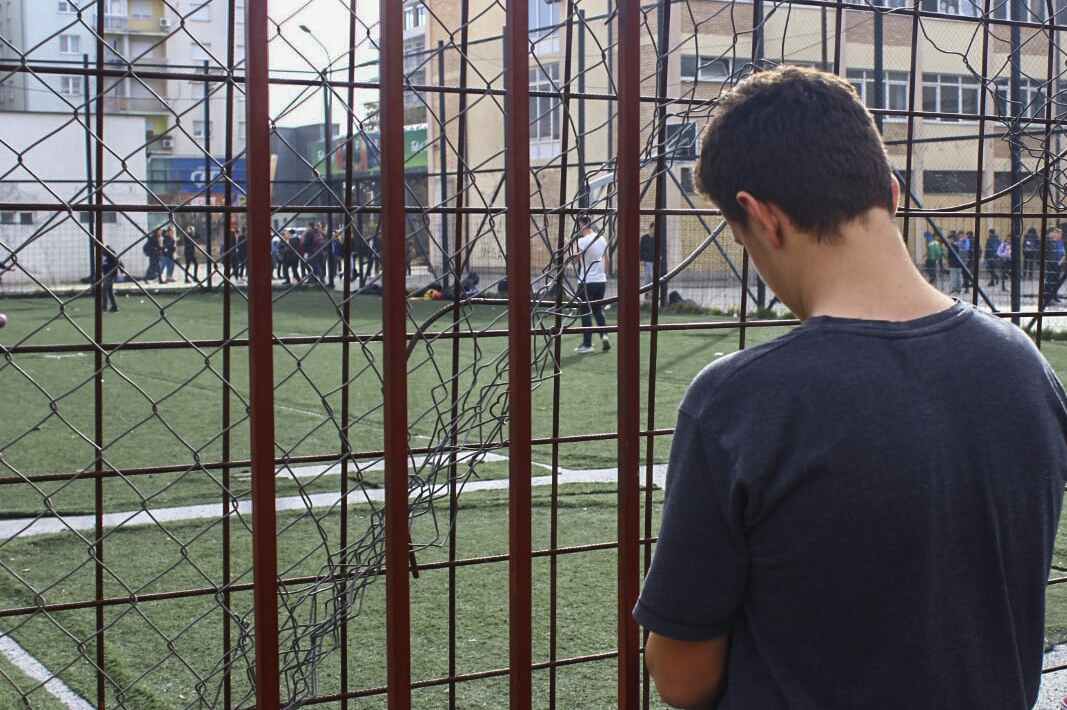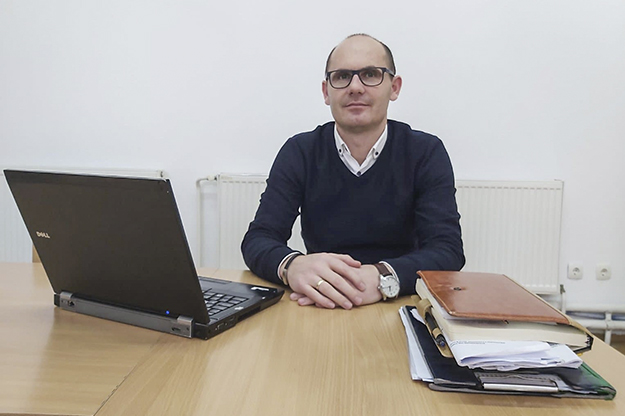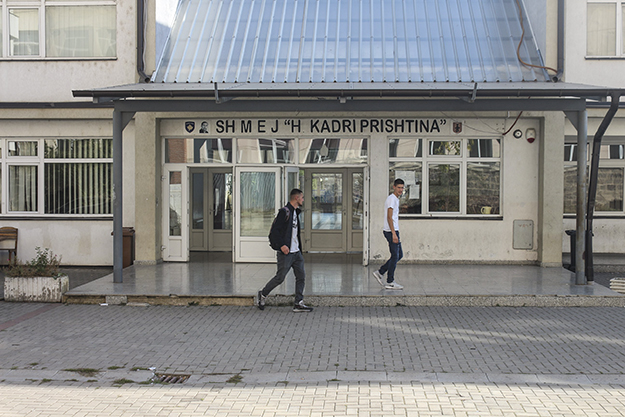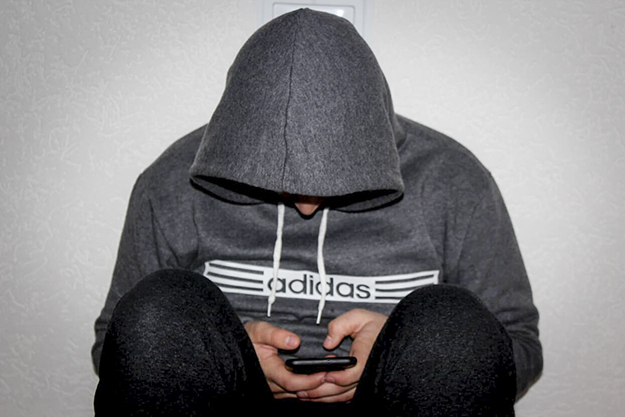Eleven-year-old Dren*, a fifth-grader, does not recall ever being addressed with a loving word by his teacher during his four years of schooling. He says the only names that he remembers the teacher calling him are “thug,” “stupid,” “lazy,” and the like.
After being attacked by other children, he says, instead of finding support and appropriate measures, he was confronted with his teacher’s harsh behavior.
“Once a classmate knocked me on the ground and when I told the teacher, Valbona, she said ‘It serves you right,’” Dren claims.
His mother Blerta supports his assertions. She says the teacher has gone so far as to put Dren in social isolation.
“Once, he was doing his homework as usual, I asked Dren about a friend of his,” Blerta says. “He told me he no longer talked to his friends as the teacher had asked other students not to speak to him, as a punishment for his misbehavior.”
She says that she has spoken the teacher, who, in order to justify her measures against the child, complained that her son was misbehaving in the classroom. “After I complained to her, the teacher became harsher to my son,” Blerta says.
What Dren is facing is known as bullying and is considered a global school problem. According to the World Health Organization, bullying is defined as: A deliberate use of force or aggression against a person or group of persons to make the victims feel offended, hurt or cause them to be in a poor physical and emotional state. Exercised consistently, it will cause not only potential social isolation but also affect psychological development.

Research and fieldwork show that the majority of students in Kosovo face some form of bullying. Photo: Qendrim Krasniqi.
Students like Dren, regarded as “mischievous” by their teachers, are not the only victims of bullying.
Agron, a 10-year-old, fifth-grader at Mihal Grameno Elementary School in Fushë Kosovë, suffers from poor health. His peers regard this as a weakness, which is why he is often mocked and even physically assaulted.
“My classmates insult me, mock me, push me,” Agron says. “Once a boy knocked me to the ground and I cried. I complained to the teacher, but she took no other action except for asking to speak with his parents, who never even showed up.”
He says that his teacher has now made him share the same bench with the boy who knocked him down. “There are too many students and she has had to sit three of us per bench,” he says “He just mocks me, insults me.”
Gresa, Agron’s mother, is concerned about the way other students treat her son.
“His classmates say, ‘I don’t want to be your friend because you’re too skinny,’” she says. “I complained to the head teacher and she did absolutely nothing. Soon after we brought him to this school, the bullying thing started, with others mocking my boy, throwing his books, notebooks and school bag on the ground.”
She says her son always shares every detail with her. “Every time he comes home, he tells of something done to him in that classroom.”
She also points to cases when Agron has been seriously injured, including shortly after he started grade four. When she went to pick him up from school, she saw that his entire forehead was swollen.
“I was terrified, so I approached his teacher who began to apologize,” Gresa says. “She told me that the student who had hurt him was very disobedient and that she could not find a way to calm him down. As the teacher was not able to solve the problem, I asked her to contact the other student’s parents.”
The mother claims that if the teacher and the student’s parents do not find a way to stop the abuse, she may be forced to take extreme measures and possibly “beat up that child.” She complains that parents of misbehaving children do not attend parent-teacher meetings even when the teacher invites them and warns their children that they cannot attend school further if they come unaccompanied by their parents.
Dren and Agron are just two of the many children in Kosovo facing such situations.
A 2015 study by the Kosovo Pedagogical Institute in nine municipalities, which involved 380 students and 138 teachers from high schools, shows that 50% of the students surveyed report having been called insulting and derogatory names by their peers on a daily, weekly, monthly or yearly basis. Twenty-seven percent report being physically pushed and knocked to the ground at least once or twice a year.
There are a number of factors that contribute to bullying remaining largely unaddressed and ignored in Kosovo. Of these, the most prominent are the lack of strategies within educational institutions for combating bullying and shortages of psychologists inside schools who would handle cases from a professional viewpoint. Another issue of concern is the intentional concealment of cases of physical and verbal violence by the schools themselves, something they do in order to maintain their performance rates vis-à-vis Municipal Departments of Education and the Ministry of Education, Science and Technology (MEST).
In addition to such issues that fall within MEST’s competencies, sociologists say other factors related to the cultural and economic setting of a society also contribute to the problem. In their view, countries with a low level of economic development and largely conservative norms show a higher likelihood of violence, including within the school environment.
The serious consequences of bullying
According to Kosovar elementary and high school leaders, while the proportions of bullying are troubling, the resources for handling such cases remain limited.
Osman Beqiri is an economist and deputy director at the Hoxhë Kadri Prishtina Economic High School in the capital. He is skeptical as to whether it is possible to find a solution to cases of bullying. “It is very difficult to handle [bullying] because I believe it will never be eradicated,” Beqiri says.
He points out that there have been cases when students have dropped out of school as a result of being bullied.
“We call their parents and tell them their child is on the decline, their emotional state is deteriorating and their grades are getting worse,” he says. “It might happen that a student drops out of school and misses a year.”
Psychologists and sociologists anxiously observe cases of bullying in Kosovo’s schools and point to the negative effects of the phenomenon.

Clinical psychologist Besnik Sherifi says that in the long term, bullying can cause low self-esteem, isolation, depression and anxiety. Photo: Qendrim Krasniqi.
Besnik Sherifi is a clinical psychologist who has worked with bullied students in the Gjilan municipality as a member of the Peer Educator Network (PEN) organization that conducts trainings on bullying. According to him, bullied students are “characterized by low self-esteem, get little emotional support from others, are more isolated, show poor academic achievements and are more likely to experience depression and anxiety.”
And it doesn’t end there, Sherifi claims. He adds that the victims of bullying face many future consequences: “Dropping out of school, social isolation, depression and the use of physical and verbal aggression.”
Dren’s mother says she has noticed her son displaying the negative effects mentioned by the psychologist, now that the boy is in his final year of the primary education system’s five-year duration.
“My son’s grades are down in almost every subject, including math, a subject his teacher used to tell me he was very good in,” she says. “It also worries me that due to the bad relationship with his teacher, my son’s grades have dropped even though he studies as hard as he used to, though he may have also lost interest.”
Problems like Dren’s do not seem short-lived. A 2019 study from Lancaster University in the UK says that experiencing bullying in childhood has long-term negative effects. The research argues that victims of bullying face a 40% greater risk of facing mental health problems by the age of 25.
“Children are the greatest imitators of their family. A violent family environment presents a model for the child who then turns violence into a social norm.”
Ferdi Kamberi, Sociologist
These problems range from dealing with depression and anxiety to financial problems linked to the difficulty of finding a job; as well as earning a lower income than those who claim not to have been bullied while at school. The study surveyed more than 7,000 students, interviewing them at regular intervals between the ages of 14 and 25.
For sociologist Albert Mecini, solving the problems of children who are victims of bullying requires greater cooperation between parents and teachers.
“Once parents realize their children are being bullied, they need to communicate with teachers or the head teacher to identify and solve the problem,” Mecini says. “It is advisable to see a psychologist to make it easier for the child to cope and overcome the deteriorated emotional state.”
Sociologist Ferdi Kamberi, author of two books on delinquency among young people, also sees the role of parents as vital in solving their children’s problems. For Kamberi, the family environment significantly affects children’s behavioral patterns at school.
“Children are the greatest imitators of their family. A violent family environment presents a model for the child who then turns violence into a social norm and manifests it against their peers, especially in the school environment,” Kamberi says. “Therefore, parents should carefully resolve their differences or problems through communication and never argue in the presence of their children.”
Meanwhile, sociologist Besim Gollopeni, a professor at Isa Boletini University in Mitrovica and president of the Albanian Sociological Association, links school violence to the social and cultural aspects of the country.
In his view, violence in schools is preceded by violence within families in conservative societies. “Domestic violence usually manifests in more conservative societies with lower levels of social integration and awareness, as well as in societies with economic and social difficulties, such as our Kosovar society,” Gollopeni says.
According to him, violence in Kosovar families stems mainly from the desire of the dominant male to control his family members. The patriarchal mindset tends to increase social pressure to subjugate others and creates incentives for aggression.
“The grounds of domestic violence in Kosovar society, rather than being rooted in tradition, are to be found in the overwhelming desire for the dominant male to maintain ‘power,’” he says. “On the other hand, there is a tendency to assume that ‘power’ or to become equal in the family by the subordinated female, thus leading to family conflicts.”
Gollopeni says this negatively impacts the children.
“Many Kosovar parents compare the current situation of their children to their own upbringing,” he says. “This comparison between different generations and times often mute the child’s voice.
Schools conceal their cases
Reporting physical and verbal harassment cases is a legal requirement, yet Kosovo schools don’t do much about it.
The Protocol on the Prevention and Referral of School Violence adopted by the Kosovo Government in 2013 requires the directors of pre-university education institutions to register reported cases of school violence and forward them to the Municipal Department of Education (MED). The MED is in turn obliged to submit a summary report to the Ministry of Education, the institution responsible for analyzing and publishing the data.
Arber Maliqi from PEN, the organization that has run trainings on bullying in Gjilan and Gjakova schools during 2016-2019, says the reporting is not happening.
“In the round tables we held with the representatives of public institutions, NGOs, school directors, MED representatives [claimed that] cases of bullying are often kept secret because, if reported, they would reflect negatively on overall school performance,” Maliqi says.
Deputy director Beqiri from Hoxhë Kadri Prishtina Economic High School in the capital confirms that school directors are reluctant to report cases of bullying. According to Beqiri, who has been in his post since 2014, only serious cases are ever reported to the MED. He claims they are only categorized as serious when they involve physical violence, while verbal harassment goes unreported.
“Usually the more serious cases are reported, while the easier ones we handle ourselves, as we don’t want to overburden them [the MED],” Beqiri says.

In general, schools do not report all cases that can be qualified as bullying, resulting in official figures not accurately reflecting reality. Photo: Merite Krasniqi.
Although he says he has chosen not to burden the MED staff, the deputy director says that reporting on its own is insufficient when dealing with such cases, as the Ministry needs to show greater commitment.
“MEST itself should get involved and conduct more frequent checks,” Beqiri says. “But reporting is not enough when there is no commitment to resolve the issue. I don’t believe there is a single school that reports all their cases.”
Reporting only cases that schools consider serious, and not others that still qualify as bullying, is a feature evident in other schools as well.
Hamdi Shyti, the director of Migjeni Elementary School in Mitrovica, says he reports only those cases where students have been issued written warnings.
Besa Bytyçi, a MEST Information Officer, says that from 2014 to 2019 a total of 130 cases of physical violence have been reported to the Education Information Management System (EMIS).
The unreported cases of bullying are not the only problem, however. Both school staff and students around Kosovo do not understand the very meaning of bullying.
“There is very little discussion and work with students in Kosovo schools regarding their awareness of the issue,” says sociologist Mecini. “There are young people who may not even know the meaning of the word bullying.”
Shemsi Berisha, director of the Specialized Mathematics Gymnasium in Prishtina, questions if school teachers are aware of bullying. “They may not sufficiently understand [bullying],” Berisha says.
Asked whether he and the school staff have received any training on handling cases of bullying, he says no. Hamdi Shyti, the director of the school in Mitrovica, says the same.

Shemsi Berisha from the Specialized Mathematics Gymnasium is one of the directors saying that they have not received training from MEST. Photo: Qendrim Krasniqi.
Yet the Ministry of Education denies this. When asked whether they have implemented training programs to inform school staff and students about bullying, MEST officials claim that information sessions on government policy papers on violence have been held for school directors and MEDs, although they do not specifically mention any trainings on bullying.
“We have held regional meetings, MED meetings, trainings and information sessions in almost all municipalities, with directors of all schools, to familiarize them with their duties and responsibilities,” says Bytyçi from MEST.
In June 2019, Kosovo passed a Law on Child Protection, while the Ministry of Education has drafted some guidelines and regulations aimed at tackling school violence. In addition to the Protocol on Prevention and Referral of Violence in Pre-University Education Institutions, there are documents such as the Manual on Preventing Negative Phenomena in Higher Secondary Schools and the Internet Child Protection Guidelines Package. However, none of these laws or regulations contain any reference to bullying.
Cyberbullying, the new form of violence
In 2013, headlines emerged in Kosovar media about a video that went viral on social networks whose protagonists were two juvenile girls.
The video showed a school student hitting and swearing at another student. Their physical quarrel was preceded by an argument at school. In revenge, the one who started the fight ordered someone to record her while she hit and insulted her peer.
The video was primarily circulated on Facebook and later widely shared on other social networks. It was even shared in some media that identified the girls. After much reaction and debate in media outlets, the video was removed from every platform, but its history did not stop there. To this day there are pictures re-posted and social media pages created to denigrate the girl who initiated the fight.
The violence the student was subjected to by the publishing of the video in question, is known as “Cyberbullying” or “Internet bullying.” According to the UN, “cyberbullying involves posting or sending electronic messages including text, pictures or videos, aimed at harassing, threatening or spreading rumors about another person.” Different studies by this organization see such online assaults as a major global concern that damages children who fall victims of this form of violence.

Instagram and Facebook, as the most popular social media platforms for students, also end up becoming sites where students encounter many forms of cyberbullying. Photo: Qendrim Krasniqi.
Such phenomena are still present nowadays, and in large proportions. A survey conducted in 2016 by the Center for Advanced Studies (FIT) involving 1,301 respondents from the seven largest municipalities in Kosovo, reveals a large number of children are harassed by electronic communication. The study found that about 27% of children aged 9 to 12 said they have been attacked online by others. The number grows for children aged 13 to 16, with 30% of them admitting to having been victims of cyberbullying.
Social networks such as Instagram and Facebook seem to be the platforms where children mostly harass and are harassed, followed by email and gaming websites. Asked about the problems they face using the internet, the students claim that insults, name calling and the posting of unpleasant content on platforms, stealing passwords and the misuse of personal data present major concerns for them.
Hamdi Shyti, the director of Migjeni Elementary School in Mitrovica, confirms that Kosovar students face such problems. He speaks of the growing number of student complaints about this form of harassment and explains the difficulties controlling it. According to him, the majority of students have mobile phones and the school is unable to control their internet activity. “When a student files a complaint, we try to address it, but we can’t control everyone,” Shyti says.
Anil Gashi from the Center for Advanced Studies and author of “Children’s Internet Security,” also says there has been an increase in internet harassment.
“This phenomenon is constantly increasing and we can affirm that student internet harassment is very easy and unfortunately very present,” Gashi says. “We must bear in mind that full protection from cyberbullying is impossible, because every internet user is at risk from this phenomenon.”
Internet use among young people turns out to be high not only in Kosovo but around the globe. The Internet Penetration and Use in Kosovo report published in 2013 by the Kosovo ICT Association (STIKK) with all municipalities surveyed, shows that over 62 percent of young people aged 10 to 30 are regular internet users. This is broadly comparable to the global average, with 2017 UNICEF figures showing 71% of children worldwide are internet users, compared to 48% of the general population.
“Adults can help younger people understand the risks they face.”
Elvis Plaku, Social networks expert
According to the STIKK survey, 27% of young people aged 10 to 19 said they didn’t care much about privacy and personal information they shared online, followed by 19% of those who said they were not informed about data privacy. Over half of young people surveyed, 68%, said they mostly use Instagram, followed by another 26% who mostly use Facebook.
Elvis Plaku, head of the consulting firm Business Challenges in Albania and an expert on social networks and digital marketing, says that a feature of cyberbullying is that it is very easily done. “Data theft or online activity like spying on one-another is now relatively easy, especially for young people who may naïvely expose every aspect of their private lives,” Plaku says.
In his view, the primary methods in which children and youngsters can be exposed to such risks are personal pictures and video sharing, or sharing other sensitive content with friends. Later, the same content may be used against them.
Plaku says internet attacks do not only cause emotional and personal damage but can also reach criminal levels. In May this year, the police arrested a youngster from Ferizaj because he was blackmailing another juvenile with Facebook messages, threatening to make public intimate pictures of her if she refused to pay him.
“Criminality is taking a new form,” says Kosovo Police spokesperson Baki Kelani, who adds that the police have recently responded by establishing a Cybercrime Investigation Sector, aimed at preventing and fighting cybercrime.
Internet harassment cases in Kosovo are addressed in the Law on Prevention and Fight of the Cybercrime. There are several cybercrimes that are considered criminal actions. They include child abuse in pornography, intrusion in computer systems, identity theft, as well as accessing and misusing bankcards.
According to Kosovo Police, between January and June 2019 alone 35 cases of cybercrimes and 150 cases of assisting with such crimes were registered. Since 2015, 195 cases have been dealt with at the central level, and 829 cases of assisting such crimes.
But cyberbullying seems difficult to manage in part due to fact deletion. According to the FIT report, half of the surveyed children facing bullying say that they have deleted messages or other content received from the person bullying them, in order to avoid having to deal with it. This, according to FIT, is a mistake as it destroys evidence of the assault and makes it impossible for children to share their concerns with others.
Elvis Plaku thinks there are some technological methods to protect young people from this form of bullying, the best one being education and self-awareness.
“Adults can help younger people understand the risks they face,” Plaku says. “Parents or teachers themselves can create forums or chat groups, where students can discuss issues and help each other address harassment and become aware that these situations can be solved.”
A lack of specialists despite the law
In many schools in Kosovo, professional support for dealing with bullying is lacking.
Osman Beqiri, deputy director of Hoxhë Kadri Prishtina Economic High School, says he even has to play the role of the school psychologist. He argues that it is difficult to address cases of bullying without a psychologist in a school with 1,265 students.
“Since schools have no psychologists, it is difficult to handle such cases. I have to play the role of psychologist and address other issues concerning attendance and learning,” Beqiri says.
According to him, the students who are victims of bullying can bring their problems to the school director, parents and police, but not to a professional that could counsel them.
Shemsi Berisha, director of the Specialized Mathematics Gymnasium, shares the same concern.
“The school has no psychologist and no secretary. It’s only me and I do all the administrative work and everything else,” Berisha says. “This is the negligence of the institutions, because the school is sometimes managed by the Municipality of Prishtina and sometimes by the Ministry of Education, Science and Technology. It is not possible for a director to deal with everything.”
Hamdi Shyti, the director of Migjeni Elementary School in Mitrovica, says that the MED is responsible for the lack of psychologists in schools, claiming that the education staffing system is politicized and aimed at rewarding party supporters.
“If politicians need to hire a psychologist, then it happens; if they don’t need one, then it doesn’t happen,” Shyti says. “They hire a handyman when maybe there’s no need for one, because that’s their electorate, but they don’t hire a psychologist.”
The Law on Pre-University Education in the Republic of Kosovo prescribes the hiring of non-teaching “pedagogues” (education support professionals) and psychologists in schools. According to Article 37 of this law, municipalities can hire non-teaching professional staff, including pedagogical and psychological staff. The 2014 Administrative Instruction for the Functioning of Pedagogical-Psychological Services in schools demands the same. According to the instruction, psychologists are obliged to offer assistance to all school students and staff in overcoming difficulties of a psychological nature.
The administrative instruction also defines the tasks that psychologists and pedagogues must accomplish. The former are obliged to offer help in overcoming the psychological difficulties of all school attendants and to contribute to the learning process as well as the cognitive, emotional, social and personal development of students. Meanwhile, the tasks of the pedagogues are mainly related to planning and programming the educational and teaching process.
The Ministry of Education justifies the lack of school psychologists with a shortage of appropriately trained staff.
“Initially, we’ve had problems with the staff, because there were no school psychologists [but only clinical ones] that could offer their services in schools,” says Besa Bytyçi from MEST. “Following a suggestion by MEST, the Department of Psychology at the University of Prishtina opened a master’s program for school psychology. As the number of professional personnel increases, there are better opportunities for regulating and offering psychological services in our schools.”
According to the data the Faculty of Philosophy presented to K2.0, in the 2018-19 academic year, 142 students graduated from the Psychology bachelor’s program and another 46 students from the School Psychology and Counselling master’s program.
There are 56 elementary and high schools in total in the capital, and only 14 school psychologists.
For the Ministry, the hiring of psychologists is also in the hands of the municipal MEDs, since they can hire based on their planning and budget capacities. According to the Ministry, there are currently 84 psychologists and pedagogues in schools around the country.
Yet, the justification provided by the Ministry of Education regarding the lack of personnel is contested. The Municipalities of Prishtina and Mitrovica state other obstacles that hinder them from offering psychological and counselling services inside schools. The Municipality of Prishtina official says they have made continuous efforts to solve this problem, but MEST and the Ministry of Finance have obstructed it.
“Despite the efforts of the Municipality of Prishtina to hire school psychologists, it was impossible until now to hire new staff as the respective ministries do not allow the inclusion of new staff on payrolls,” claims Prishtina’s officer for media relationships.
There are 56 elementary and high schools in total in the capital, and only 14 school psychologists are hired in total, covering 27 schools.
Unlike the Municipality of Prishtina, Mitrovica provides a different explanation for not hiring school psychologists. According to its officials, it is the lack of funds that is impeding the hiring.
“Budgetary limitations do not allow us to hire psychologists,” says the Municipality’s Information Office. “We are trying to offer this service in schools with a large number of students.”
None of the 32 elementary and high schools in Mitrovica municipality have employed any psychologist, while there are only five pedagogues working in total.
For Rrahman Jasharaj, Chairman of the United Trade Union of Education, Science and Culture (SBAShK), the hiring of educational staff is a competence of the municipalities and not of the Ministry of Education. In his view, the municipalities, when planning for their budget, leave out the recruitment of psychologists and distribute the budget to unnecessary items.
“During their budget planning, the municipalities have been tightfisted when it comes to hiring psychologists in schools,” Jasharaj says. “On the other hand, in order to accommodate the political party militants, they have hired extensively in administration, which is now overburdened in most municipalities.”
He argues that municipalities should employ people based on school needs and that the recruitment of psychologists is essential.
"Students show insecurity and a lack of trust in filing complaints with schools, due to the fear that they will face forms of retaliation."
Coalition of Child Protection Organizations
Civil society representatives, dealing with children’s rights, see the lack of school psychologists as concerning. Arbër Maliqi from PEN says his organization’s work on the ground has noted a lack of professional staff to deal with cases of bullying.
The Coalition of Child Protection Organizations (KOMF) expresses the same concerns. According to this organization, the students do not feel safe presenting complaints to the school staff and their problems therefore remain untreated.
“Based on consultations conducted with children, we can say that, in general, students show insecurity and a lack of trust in filing complaints with schools, due to the fear that they will face forms of retaliation,” KOMF says. “They also do not believe their complaints will be taken into consideration and treated with priority by the school staff.”
KOMF held consultations between 2015 and 2018, under the “Young With a Voice” project, whose goal was to raise the voice of young people against the risk of marginalization.
“Engaging psychologists in school institutions will have an impact toward reducing student harassment,” says PEN clinical psychologist Sherifi. “They can deal with student problems by offering emotional and social support to students who are bullied, and by providing various ways to treat the students and prevent bullying.”
In the meantime, children like Dren and Agron continue to lack the necessary support needed to help them in school. And these problems do not remain solely in the school system but instead carry over into society. K
*Editor’s note: Names of children and their parents mentioned in the article have been changed to protect their identities.
Edited by Ervin Qafmolla.
Additional editing: Jack Butcher and Bronwyn Jones.
Feaure image: Qendrim Krasniqi.
This article has been written as part of the second cycle of the Human Rights Journalism Fellowship Program supported by the European Union Office in Kosovo, co-financed by the project ‘Luxembourg support to civil society in Kosovo,’ financed by the Government of the Grand Duchy of Luxembourg and managed by Kosovar Civil Society Foundation (KCSF), as well as from the National Endowment for Democracy (NED). This program is being implemented by Kosovo 2.0, in partnership with Kosovar Center for Gender Studies (KCGS), and Center for Equality and Liberty (CEL).
Its contents are the sole responsibility of Kosovo 2.0, KCGS, and CEL and do not necessarily reflect the views of the donors.











